A survey that was conducted by Mwelekeo Insights had assessed public confidence in President William Ruto’s latest cabinet appointees.
The study focused on their academic qualifications, professional experience, performance during vetting, and their ability to balance political ambitions with cabinet responsibilities. It also explored how Kenyans perceive their overall leadership abilities and effectiveness in office.
Lee Kinyanjui’s Academic Qualifications
Respondents were asked if Lee Kinyanjui, the Cabinet Secretary for Trade and Industrialization, was academically qualified for the position. A large majority, 87.9%, said Yes, while 4.7% felt he was not qualified. The rest were either unsure or did not respond.
Many participants also noted that his academic qualifications are relevant to the ministry he was appointed to.
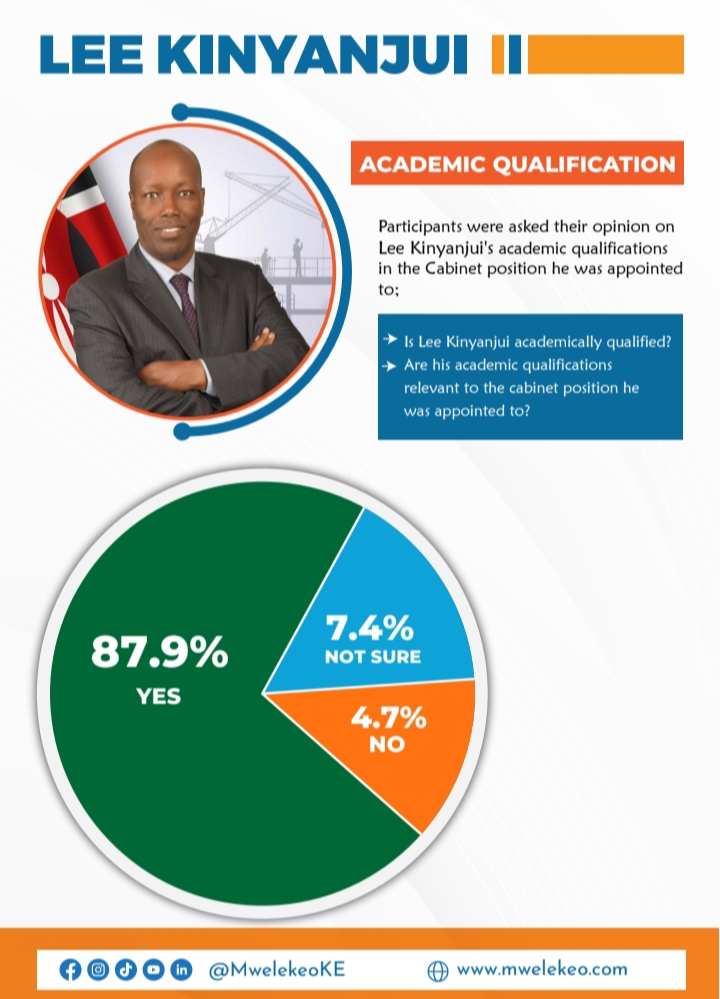
Lee Kinyanjui’s Professional Experience
Kinyanjui’s previous leadership roles gave many Kenyans confidence in his ability to perform well as CS. His record includes serving as Governor of Nakuru County, as Chairman of the National Transport and Safety Authority (NTSA), as a Minister, and as a Member of Parliament (MP).
These roles were cited as important contributing factors that could help him steer the trade docket.
Lee Kinyanjui’s Vetting Performance
During the vetting process, participants highlighted his tact in responding to questions, his ability to instill confidence, and his defense of his record as governor.
He also addressed sensitive matters such as the welfare of street children, which resonated with many.
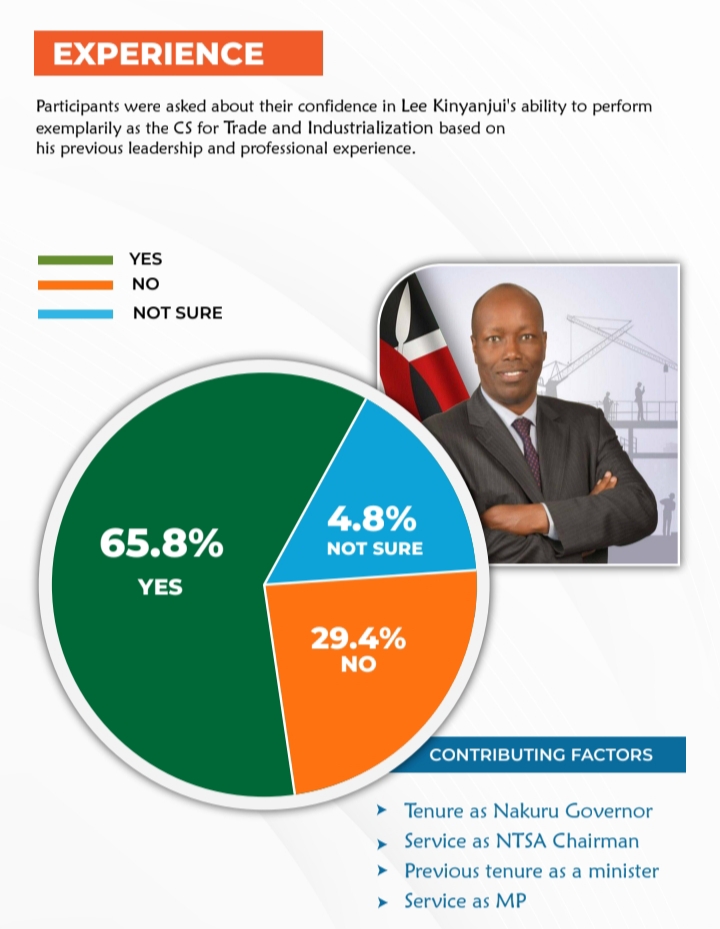
William Kabogo’s Academic Qualifications
The poll also assessed William Kabogo, appointed as the Cabinet Secretary for Information, Communication, and Technology (ICT).
About 74.6% of participants said he was academically qualified, 13.5% disagreed, while 11.9% said they were not sure.
William Kabogo’s Professional Experience
Respondents were asked about Kabogo’s professional and leadership experience. They pointed to his tenure as Kiambu Governor, his time as an MP, and his business experience as strong foundations for his new role.
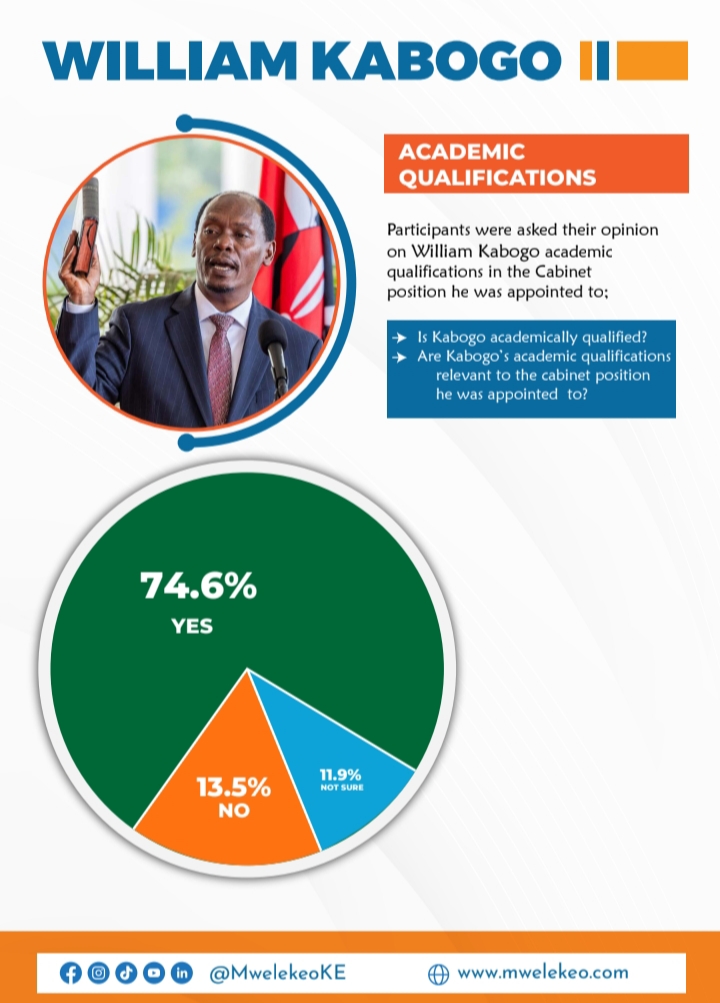
William Kabogo’s Vetting Performance
During vetting, Kabogo impressed many with his knowledge of the ICT ministry’s workings, his ability to respond to contentious questions, and his assurance of readiness to take up the role.
Mutahi Kagwe’s Academic Qualifications
The survey also examined Mutahi Kagwe, appointed as CS for Agriculture and Livestock Development.
Results showed 74.3% of respondents believed he was academically qualified, 8.5% disagreed, and 17.2% were not sure.
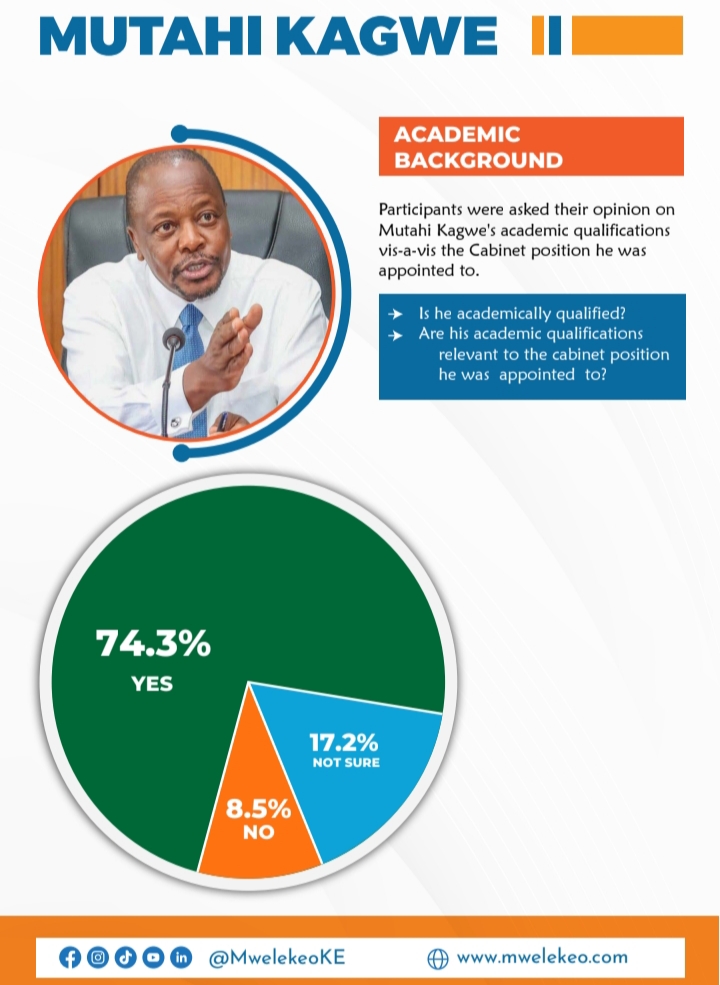
Mutahi Kagwe’s Professional Experience
Kagwe’s confidence rating was linked to his past roles, particularly as Health CS during the Covid-19 pandemic and his earlier service in the ICT docket.
Many respondents saw these as valuable experiences that could help him in managing the agriculture sector.
Mutahi Kagwe’s Vetting Performance
On his vetting performance, participants considered his tact in answering questions, his knowledge of the ministry’s challenges and opportunities, and his promise to include Kenyans’ views in projects like nationwide livestock vaccination.
However, some noted that he openly acknowledged the KEMSA scandal that happened under his watch during Covid-19.
Kenyans’ Views on Lee Kinyanjui’s Ability
Beyond qualifications and vetting, Mwelekeo Insights asked Kenyans about Kinyanjui’s ability to succeed in his new role. Many said his professional experience, knowledge of government and ministries, and ability to handle the political environment gave them confidence.
However, some pointed out that his political ambitions could affect his work.
Balancing Politics and Cabinet Duties
When asked if Kinyanjui could balance his political ambitions with his constitutional duties, 54.8% said Yes, 39.5% said No, while 5.7% were Not Sure.
This shows that while most Kenyans are optimistic, a significant portion remain cautious about political interference in his work.
Overall Confidence in Leadership
Finally, the survey asked about overall confidence in Kinyanjui’s leadership as Trade CS. Results showed that 60.2% had high confidence, 33.8% had medium confidence, and 6% had low confidence.
Conclusion
The Mwelekeo Insights survey paints a mixed but generally positive picture of President Ruto’s cabinet appointees.
Lee Kinyanjui, William Kabogo, and Mutahi Kagwe received high ratings for their academic qualifications and past leadership experience.
Their performances during vetting also strengthened public trust, although past controversies such as the KEMSA scandal continue to shape perceptions.
Kenyans remain watchful of whether these leaders will balance politics with service delivery, but overall, confidence levels suggest the public expects them to deliver in their new dockets.
It’s been almost 9 months since there appointment, have they fulfilled your expectations?
To access the full details of this survey kindly visit there official website for the full report and also you’ll be be able to access quite a number of brainstorming reports.
Locate them on X, @MwelekeoKe, Facebook, @MwelekeoKe and Instagram @MwelekeoKe.







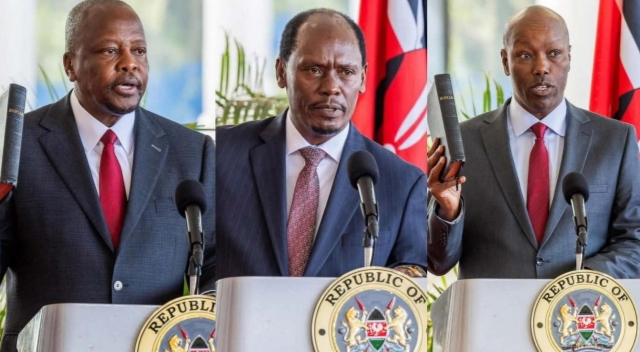













Add Comment